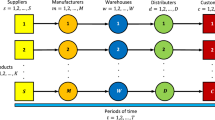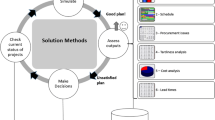Abstract
In many large-scale project scheduling problems, multiple projects are either taking place at the same time or scheduled into a tight sequence in order to efficiently share a common resource. One example of this is the computing resource allocation at an Application Service Provider (ASP) which provides data processing services for multiple paying customers. Typical services provided by ASPs are data mining, payroll processing, internet-based storage backup services and Customer Relation Management (CRM) services. The processing mode of an ASP can be either batch or concurrent, depending on the type service rendered. For example, for CPU intensive or long processing time required services, it would be more economical to processes one customer request at a time in order to minimize the context switching overhead. While the data transaction processes within a service request are subject to certain precedence relationships, the requests from different customers to an ASP are independent of each other, and the total time required to process a service request depends on the computing resource allocated to that request. The related issue of achieving an optimal use of resources at ASPs leads to problem of project scheduling with controllable project duration.
In this paper, we present efficient algorithms for solving several special cases of such multi-project scheduling problems with controllable project duration and hard resource constraints. Two types of problems are considered. In type I, the duration of each project includes a constant and a term that is inversely proportional to the amount of resource allocated. In type II, the duration of each individual project is a continuous decreasing function of the amount of resource allocated.
Similar content being viewed by others
References
B. Alidaee and A. Ahmadian, Two parallel machine sequencing problems involving controllable project project duration, European Journal of Operational Research 70 (1993) 335–341.
B. Alidaee and A. Ahmadian, Scheduling on a single processor with variable speed, Information Processing Letters 60 (1996) 189–193.
B. Alidaee and G.A. Kochenberger, A framework for machine scheduling problems with controllable project durations, Journal of Production and Operations Management 5 (1996) 391–405.
R. Armstrong, S. Gu and L. Lei, An efficient algorithm for a class of two-resource allocation problems, ORSA Journal on Computing 10(1) (1998) 114–120.
P. Brucker, A. Drexl, R. Mohring, K. Neumann and E. Pesch, Resource-constrained project scheduling: Notation, classification, model, and methods, European Journal of Operational Research 112 (1999) 3–41.
K. Chari, Resource allocation and capacity assignment in distributed systems, Computers and Operations Research 23 (1996) 1025–1041.
T.C.E. Cheng, Z.-L. Chen and C.-L. Li, Parallel-machine scheduling with controllable project durations, IIE Transactions 28 (1996) 177–180.
R.L. Daniels and J.B. Mazzola, Flow shop scheduling with resource flexibility, Operations Research 42 (1992) 504–522.
R.L. Daniels and R.K. Sarin, Single machine scheduling with controllable project durations and number of projects tardy, Operations Research 37 (1989) 981–984.
B.R. Fox and M. Ringer, Planning and scheduling benchmarks, Homepage (March 6, 1995) posted at ftp://ftp.neosoft.com/pub/users/b/benchmrx/homepage.html.
J. Grabowski and A. Janiak, Project-shop scheduling with resource-time models of operations, European Journal of Operational Research 28 (1987) 58–73.
W. Herroelen, B.D. Reyck and E. Demeulemeester, Resource-constrained project scheduling: a survey of recent developments, Computers and Operations Research 25 (1998) 279–302.
T. Ibaraki and N. Katoh, Resource Allocation Problems: Algorithmic Approaches (MIT Press, Cambridge, MA, 1988).
Karabati, Selcuk, P. Kouvelis and G. Yu, The discrete resource allocation problem in flow lines, Management Science 41 (1995) 1417–1430.
S.R. Lawrence and T.E. Morton, Resource-constrained multi-project scheduling with tardy cost: comparing myopic, bottleneck, and resource pricing heuristics, European Journal of Operational Research 64 (1993) 168–187.
B. Lee and G.V. Reklaitis, Optimal scheduling of cyclic batch processes for heat integration-II: extended problem, Computers and Chemical Engineering 19 (1995) 907–931.
K.M. Mjelde, Methods of the Allocation of Limited Resources (Wiley, New York, 1983).
E. Nowicki, An approximation algorithm for the m-machine permutation flow shop scheduling problem with controllable project durations, European Journal of Operational Research 70 (1993) 342–349.
E. Nowicki and S. Zdrzalka, A survey of results for sequencing problems with controllable project durations, Discrete Applied Mathematics 26 (1990) 271–287.
B. Qin, Meet real-time requirements of parallel programs and maximally utilize system resources, IEEE Transactions on Software Engineering 19 (1993) 976–981.
S.S. Panwalkar and R. Rajagopalan, A single machine sequencing problem with controllable project durations, European Journal of Operational Research 59 (1992) 298–302.
S. Pierre and R. Beaubrun, A routing algorithm for distributed communication networks, in: Proceedings of ICC '97 IEEE International Conference on Communications, Montreal, Quebec, Canada (June 8-12, 1997).
P.S. Pulat and S.J. Horn, Time-resource tradeoff problem, IEEE Transactions on Engineering Management 43 (1996) 411–416.
R. Slowinski, Multiobjective network scheduling with efficient use of renewable and nonrenewable resources, European Journal of Operational Research 7 (1981) 265–273.
F.B. Talbot, Resource-constrained project scheduling with time-resource trade-offs: the nonpreemptive case, Management Science 28 (1982) 1197–1210.
L.N. Van Wassenhove and K.R. Baker, A bicriterion approach to time/cost tradeoffs in sequencing, European Journal of Operational Research 11 (1982) 48–54.
R.G. Vickson, Choosing the project sequence and project durations to minimize total processing plus flow cost on a single machine, Operations Research 11 (1980) 48–52.
S. Zdrzalka, Scheduling projects on a single machine with release dates, delivery times and controllable project durations: worst-case analysis, Operation Research Letters 10 (1991) 519–524.
Author information
Authors and Affiliations
Rights and permissions
About this article
Cite this article
Lee, CY., Lei, L. Multiple-Project Scheduling with Controllable Project Duration and Hard Resource Constraint: Some Solvable Cases. Annals of Operations Research 102, 287–307 (2001). https://doi.org/10.1023/A:1010918518726
Issue Date:
DOI: https://doi.org/10.1023/A:1010918518726




